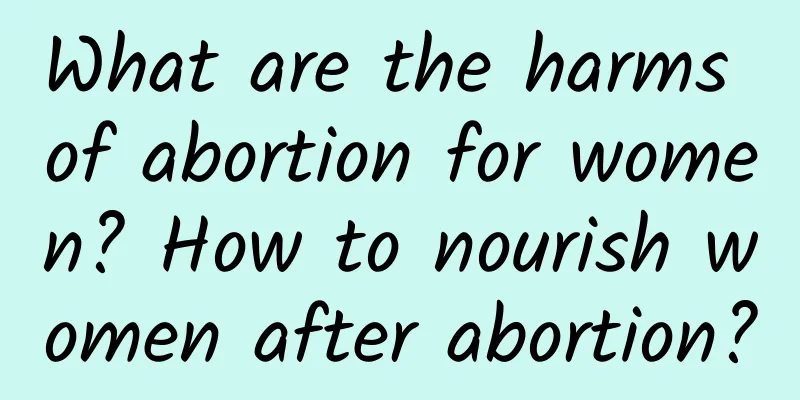What are the harms of abortion for women? How to nourish women after abortion?

|
Speaking of abortion, I believe many people are familiar with it. Everyone also knows that abortion has many harms to women, so don't do it lightly. The following introduces the harms and taboos of abortion for women and the methods of nourishment after abortion, so that everyone can learn more about abortion. Although abortion is a common surgery, it has certain risks. There are many risk factors that may occur after an abortion. Therefore, women need to review the harm of abortion to the body. So what are the harms of abortion for women? How to nourish after an abortion? The following will introduce them one by one for your reference. What are the dangers for women after abortion? 1. Infection Some informal clinics have incomplete facilities and lax disinfection, which can easily cause infection to the mother. 2. Endometriosis Repeated dilation of the cervical canal can easily cause damage and adhesion of the cervical canal, leading to menstrual blood retention, inducing endometriosis and causing dysmenorrhea. 3. Cause endocrine disorders After pregnancy, the progesterone in women's bodies will increase, the endometrium will thicken, and the breasts will enlarge, thus laying the foundation for the development of the fetus. However, an inappropriate abortion will cause sudden changes in the body's endocrine system. If the body has not yet adjusted, and then an abortion is performed, it will cause endocrine disorders. 4. Increased spontaneous abortion rate A common complication after artificial abortion is cervical injury, especially in unmarried women, the possibility of cervical injury is greater. When the woman becomes pregnant again after marriage, premature birth or late miscarriage may be caused by cervical incompetence. 5. Increased perinatal mortality Some artificial abortion operations damage the endometrial muscle layer, causing placental blood circulation disorders during the next pregnancy, causing placental insufficiency, resulting in fetal hypoxia, slow growth, premature stillbirth and increased neonatal mortality. 6. Pelvic inflammatory disease Multiple abortions will increase the chance of uterine infection and the incidence of pelvic inflammatory disease. In severe cases, it can also lead to uterine adhesions and menstrual disorders. If pelvic inflammatory disease recurs, it will cause chronic lower abdominal pain, seriously affecting women's quality of life in the future. 7. Damage to the endometrium Every abortion may damage the endometrium. The more times the scraping is performed, the more serious the damage to the endometrium will be. In severe cases, it may even cause uterine perforation. When you become pregnant again, it is easy for the placenta to implant and adhere, causing dystocia and postpartum hemorrhage. 8. Ectopic pregnancy According to statistics, nearly 1% of induced abortions are accompanied by infection, which will cause inflammation of the endometrium and fallopian tubes, and inflammation of the endometrium and fallopian tubes is an important cause of ectopic pregnancy. 9. Infertility According to relevant reports, the infertility rate after unmarried abortion (especially for the first abortion) is as high as 10%. The reasons may be adhesions between the cervix and uterine cavity after surgery, which affects pregnancy; it may also be obstructed fallopian tubes or tubal motility disorders after surgery; or repeated suction and scraping, which causes the endometrium to become thinner and thinner, without the good soil needed for the fertilized egg to implant, affecting the development of the embryo, and in severe cases, causing lifelong infertility. 10. Others If the pregnancy is too late or the abortion is done illegally, it may cause uterine perforation, heavy bleeding, or severe infection, which may be life-threatening or leave sequelae. How to nourish after abortion? 1. Pay attention to dietary supplements Because abortion causes certain damage to the body, not only does it cause a certain amount of blood loss, but the psychological pressure and physical pain during the abortion process also make the body weaker after the abortion, and some people may even have anemia. It is absolutely necessary to take proper nourishment, and the degree and duration of nourishment should be considered comprehensively according to the physical condition of the aborted person and the amount of blood loss. It is appropriate not to have too much nutrition, nor to have too little nutrition. First of all, we must ensure the supply of high-quality protein, adequate vitamins and inorganic salts, especially sufficient iron to prevent the occurrence of anemia. Food selection should be nutritious and easy to digest and absorb. Fresh fish, tender chicken, eggs, animal liver, animal blood, lean meat, soy products, milk, jujube, lotus seeds, fresh fruits and vegetables can be provided. 2. Pay attention to dietary taboos Do not eat or eat less greasy, raw and cold food. Do not eat radish, hawthorn, bitter gourd, orange and other foods that have a cooling effect on the qi and blood circulation. Eat more easily digestible food. The time for nourishing is preferably half a month. For those who are weak, have poor physical condition, or have lost a lot of blood, the time for nourishing can be appropriately extended. 3. Health regimen (1) Egg and Date Soup Ingredients: 2 eggs, 10 red dates, and appropriate amount of brown sugar. Method: Put water in a pot and bring it to a boil, then add eggs and cook. When the water boils again, add red dates and brown sugar and simmer for 20 minutes. Efficacy: It has the effect of replenishing qi and nourishing blood. It is suitable for the conditioning of anemia and insufficient qi and blood after illness and childbirth. (2) Lychee and jujube soup Ingredients: 7 dried lychees and 7 dried dates. Method: Add all the ingredients into water and boil it, take 1 dose per day. Efficacy: It has the effect of nourishing blood and promoting body fluid, and is suitable for women with anemia and physical weakness after miscarriage. |
Recommend
To prevent vulvar leukoplakia, you must understand its cause
Vulvar leukoplakia is a common gynecological dise...
How to care for threatened abortion
How should threatened abortion be cared for? Whet...
What should not be eaten after miscarriage? What should be paid attention to in dietary adjustments after miscarriage?
After a miscarriage, you must make a reasonable a...
Nursing points for cervical precancerous lesions
What are the key points in the care of cervical p...
Causes of pelvic inflammatory disease in women
Pelvic inflammatory disease is very common in cli...
What are the common causes of adnexitis?
If you suffer from adnexitis, you should actively...
Is it normal to be negative for Chlamydia?
A negative chlamydia result is generally consider...
What medicine should women take for irregular menstruation? Chinese medicine classification and treatment methods for irregular menstruation
Irregular menstruation is a common condition and ...
Self-diagnosis of gynecological symptoms. Learn these methods to prevent gynecological diseases early.
Due to the physiological structure of women, the ...
How much does a hyperprolactinemia test usually cost?
Hyperprolactinemia is a type of hyperprolactinemi...
Mid-stage vulvar leukoplakia has certain characteristics on the skin
Mid-stage vulvar leukoplakia has certain characte...
Will cervicitis delay menstruation? How can women prevent cervicitis?
Cervicitis is one of the common gynecological inf...
3 types of dysfunctional uterine bleeding
Functional uterine bleeding is mainly caused by a...
What you need to know about the examination basis for diagnosing cervical hypertrophy
Cervical hypertrophy is also a common gynecologic...
What are the causes of adnexitis?
People usually call the adhesion between the fall...









